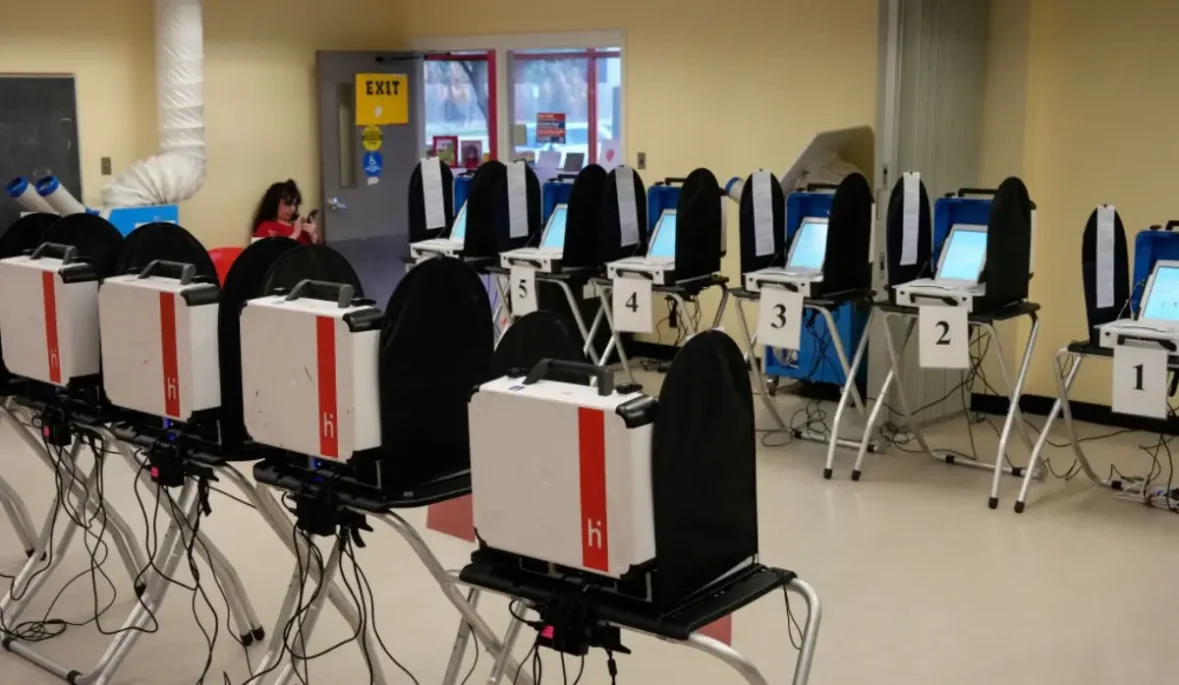The 5th U.S. Circuit Court of Appeals has rejected a longstanding legal precedent that allows different racial and ethnic groups to form coalitions to make claims of racial gerrymandering and discrimination under the Voting Rights Act to challenge voter redistricting plans.
The court ruled 12-5 against the U.S. Justice Department, civil rights groups, Black and Hispanic voters and other plaintiffs in favor of arguments made by officials representing Galveston County in Texas. Their decision, which applies to the states within the 5th Circuit — Texas, Louisiana and Mississippi — will likely be appealed to the U.S. Supreme Court, reported Houston Public Media.
The case arose in 2021 when the Republican-majority Galveston County Commissioners Court redrew the county’s political boundaries in a way that broke up a voting district that had previously grouped together Black and Hispanic communities, which together make up 39 percent of the county’s population and tend to vote for Democrats, according to CNN.

Under the county’s new plan, white voters, who largely support Republican candidates, now constitute the majority in all four of the commission districts.
Lawmakers in Texas insisted during the redistricting process that they drew the maps race-blind because they were not required by law to review any racial data as they drew them.
In 2022, a group of local officials in Galveston, civil rights groups and the Justice Department sued, asserting that the new redistricting plan diluted the votes of the majority-minority coalition and violated Section 2 of the Voting Rights Act of 1965, which bans racial gerrymandering, in a case that was consolidated as Petteway v. Galveston County.
Their complaint, filed in the U.S District Court of the Southern District of Texas, also argued that the plan adopted by Galveston County “was enacted with the intent to discriminate on the basis of race and national origin” and that it discriminated against minority voters through “the intentional dismantling of Precinct 3 as a performing majority-minority precinct through the cracking of Black and Latino voters across four precincts in which they will have no opportunity to elect their preferred candidate because of racially polarized voting.”
In October 2023, the District Court Judge, Jeffrey Vincent Brown, ruled that the 2021 precinct map was “a clear violation” of Section 2 of the Voting Rights Act because “it summarily carved up and wiped off the map” the sole majority-minority district in the county.
“What happened here was stark and jarring,” Brown held in his scathing opinion. “The commissioners court transformed Precinct 3 from the precinct with the highest percentage of Black and Latino residents to that with the lowest percentage. … The circumstances and effect of the enacted plan were ‘mean-spirited’ and ‘egregious’ given that ‘there was absolutely no reason to make major changes to Precinct 3,’” the judge continued, excerpting from the testimony of an expert witness Brown heard give testimony during a bench trial before his ruling.
The district court judge said the county’s redistricting plan “must be overturned. … The plaintiffs have demonstrated that the totality of the circumstances shows that Black and Latino voters in Galveston County have ‘less opportunity than other members of the electorate to participate in the political process and to elect representatives of their choice.’”
Brown did not rule on whether the county intended to discriminate against minority voters since the injunctive relief sought by plaintiffs for that claim was essentially the same as what they had requested for the Section 2 discriminatory results claim.
The district court then redrew the county’s maps to be in compliance with the Voting Rights Act when county leaders failed to do so, reported Houston Public Media.
In its appeal to the 5th Circuit, the county argued that neither Blacks nor Latinos alone constitute an outright majority in Precinct 3 and that Section 2 of the Voting Rights Act does not protect the rights of different racial or ethnic groups to form coalitions, noting that other federal judicial circuits across the country have split on this issue.
Joseph Nixon, the lawyer for Galveston County, argued before the court in May that the Voting Rights Act was written to only bar discrimination against a single group of protected voters, such as Black or Latino Americans, the Texas Tribune reported. The coalition argument could lead to groups “stacking” different pockets of voters of color to achieve certain political outcomes, essentially becoming political coalitions, he said.
The 5th Circuit’s ruling on Aug. 1 in favor of Galveston County overturned a precedent its own judges had set in 1988 in Campos v. City of Baytown, which affirmed that dilution of Black and Mexican American voters had occurred. In that prior case, the majority opinion found “nothing in the law that prevents the plaintiffs from identifying the protected aggrieved minority to include both Blacks and Hispanics.”
“After reconsidering Campos en banc, this court holds that Section 2 of the Voting Rights Act does not authorize separately protected minority groups to aggregate their populations for purposes of a vote dilution claim,” said Judge Edith H. Jones, writing for the majority. (En banc legal proceedings are those involving a full court, rather than a smaller panel of judges who serve on the court).
Christian Adams, a lawyer for Galveston County, called the 5th Circuit’s ruling a “great win for the rule of law and the Constitution,” reported CNN.
In her dissenting opinion, Judge Dana M. Douglas wrote, “Today, the majority finally dismantled the effectiveness of the Voting Rights Act in this circuit, leaving four decades of en banc precedent flattened in its wake.”
Valencia Richardson, an attorney with the Campaign Legal Center representing the plaintiffs, told Houston Public Media, “We’re disappointed with this decision, which not only ignores decades of legal precedent but also the language of the Voting Rights Act of 1965. We’re considering next steps at this time.”
“Today the court told the Black and Latino residents of Galveston, who entered this fight together, that they cannot vote as one community,” said Sarah Xiyi Chen, senior supervising attorney for the Voting Rights Program at the Texas Civil Rights Project, one of the plaintiffs in the case, in a press release.
“We are extremely disappointed with this ruling,” she said. “The Voting Rights Act was designed to protect communities like our clients in Galveston’s former Precinct 3, people who have common interests and face similar threats to silence their voices.”
The 5th Circuit remanded the case back to the district court to reconsider the as-yet unadjudicated issue of whether the voter map was redrawn with the intent to discriminate against Black and Hispanic voters.
In their original complaint, plaintiffs’ attorneys argued that local and state entities had engaged in discriminatory actions against Black and Latino residents in Galveston County that affected their right to vote. Academic experts representing plaintiffs cited studies of voter demographic data, census data, county commission meeting records, newspaper articles and “statements made by decision-makers and Galveston County residents” to make the case for intentional discrimination.
The 5th Circuit ruling comes just over a year after the U.S. Supreme Court narrowly upheld Section 2 of the Voting Rights Act in an Alabama case involving racial gerrymandering of congressional districts, reported NPR.
A similar case is pending in the 11th Circuit, where Georgia Secretary of State Brad Raffensperger is appealing a district court ruling relating to minority coalition groups’ challenges to maps for statewide and congressional voting districts, based on Section 2 of the Voting Rights Act. His appeal also challenges the right of private individuals and groups to sue under Section 2, using arguments similar to a successful 8th Circuit appeal last year, reported the Savannah Morning News.
In that 8th Circuit case, a divided three-judge panel ruled that only the attorney general of the United States has the power to enforce Section 2 of the act, upholding a lower court’s dismissal of a case brought by the Arkansas NAACP and others to challenge a 2021 voting map that they argued diluted the strength of Black voters.
In his order dismissing the case in 2022, U.S. District Judge Lee Rudofsky said there was a “strong merits case” that some of the voting districts the plaintiffs challenged were unlawful under Section 2, but that he was unable to decide on the merits because Congress had not expressly provided a private right of action to enforce the law.
In his dissenting opinion, 8th Circuit Judge Lavenski Smith, a Black jurist appointed by George W. Bush, noted, “Over the last 40 years, at least 182 successful suits under the section have been brought forward, yet only 15 of those suits were launched by the Department of Justice, leaving more than 100 suits to be launched by private plaintiffs,” adding, “Rights so foundational to self-government and citizenship should not depend solely on the discretion or availability of the government’s agents for protection.”
The 11th Circuit appellate court’s pending decision will have an immediate impact on voter maps and future elections in Alabama, Georgia, and Florida, the states it governs. It is also likely to inform how other judges consider the application of Section 2 in the ongoing Texas case in the 5th Circuit, as well as in other federal judicial circuits.
Concerned about what they consider the ongoing dismantling of the Voting Rights Act, in April, attorneys general from 18 states and the District of Columbia filed an amicus brief to oppose Raffensperger’s challenge in Georgia.
“Section 2 is plainly constitutional, and dozens of courts — including the Supreme Court — have ruled that there is a private right of action to enforce it,” said D.C. Attorney General Brian Schwalb in a statement, adding that the claims by Raffensperger “run roughshod over democratic protections, have no basis in law or fact, and should be soundly rejected.”


